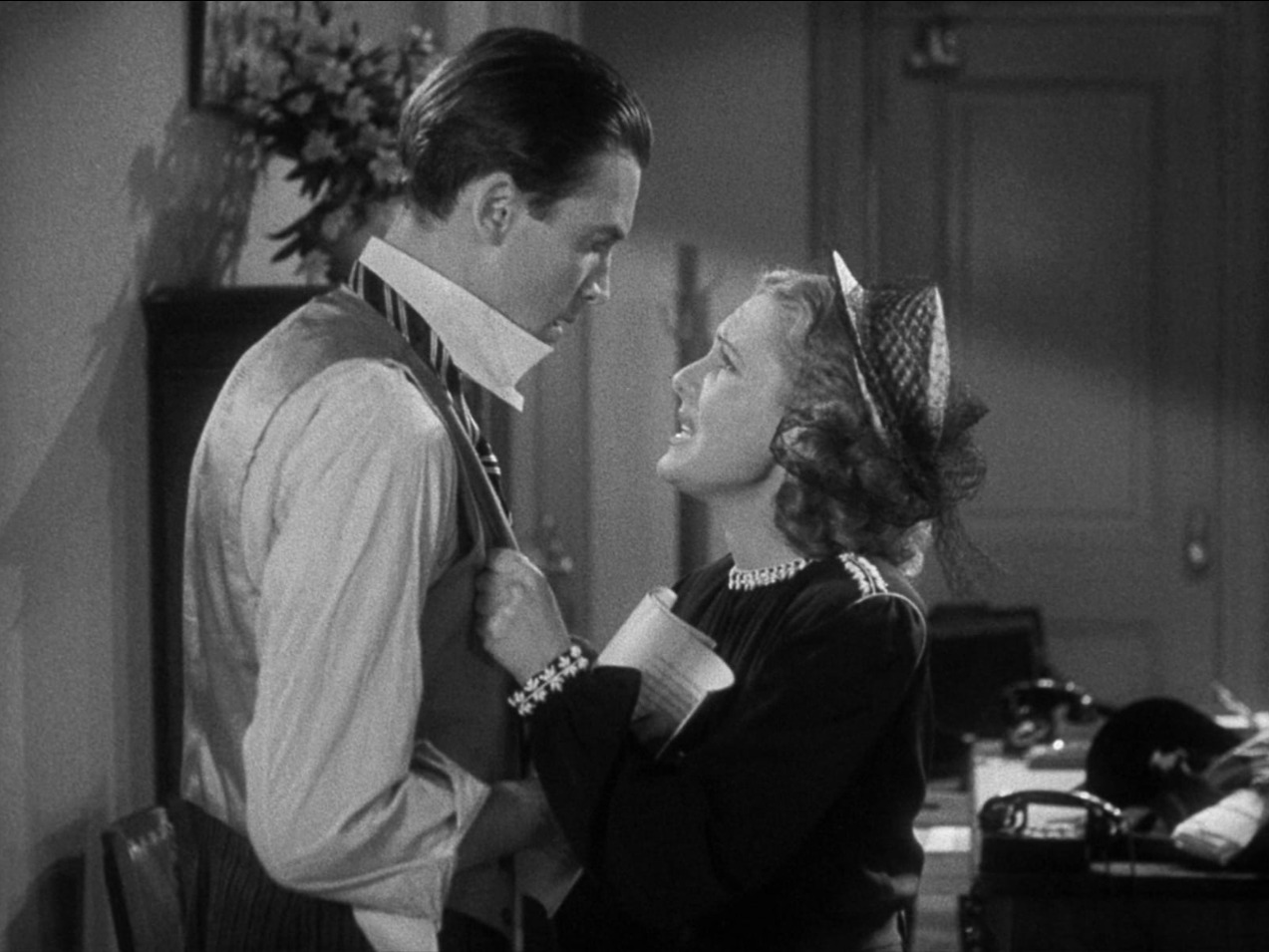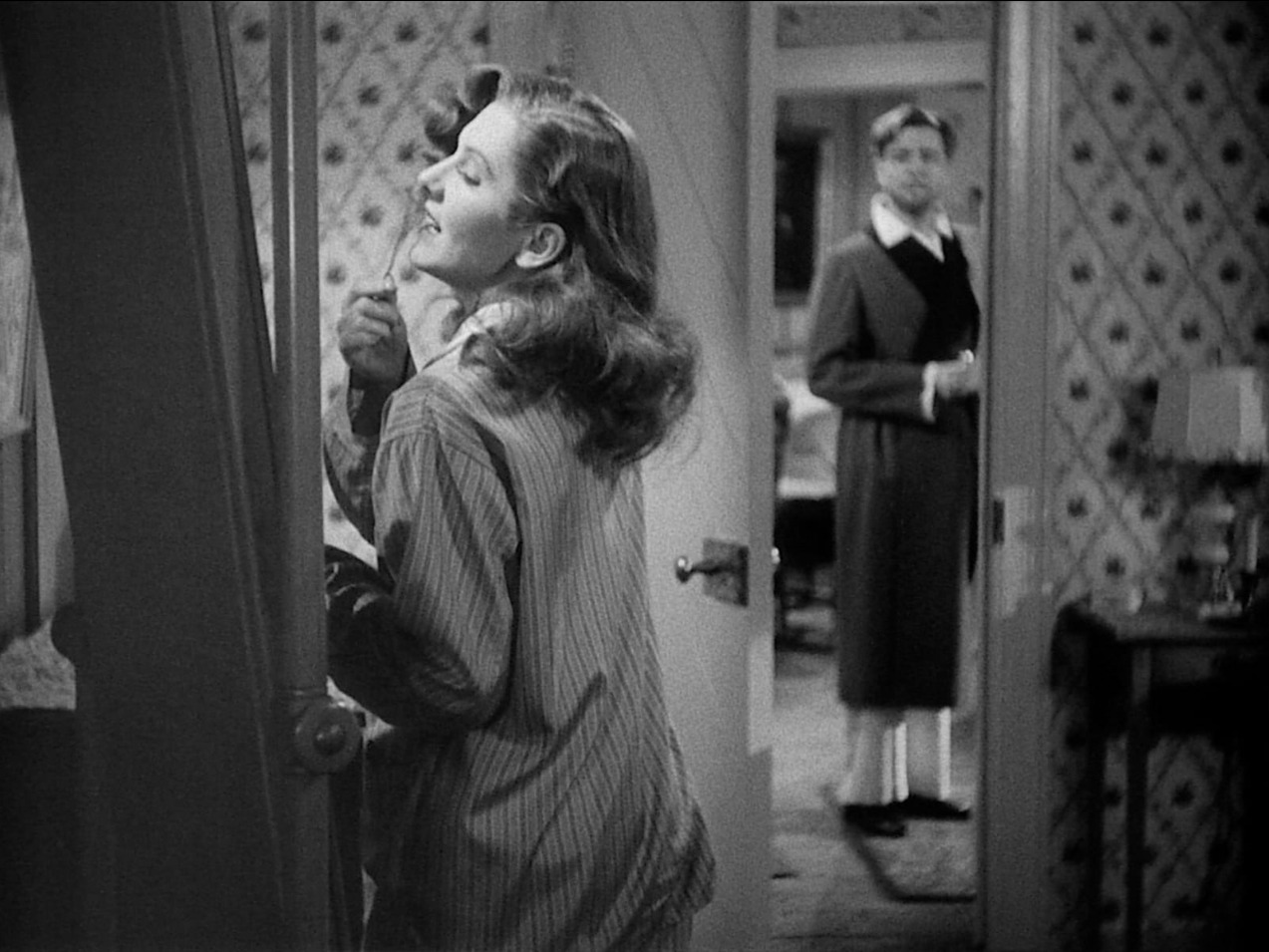Jean Arthur, the Nonconformist

“You’ve never seen prairie grass with the wind leaning on it, have you, Diz?”
Jean Arthur asks this poetic, expressively peculiar question of Thomas Mitchell in Frank Capra’s 1939 Mr. Smith Goes to Washington, and we understand her yearning for truth and beauty and the simpler life—one less corrupt, less hardened. Arthur is Clarissa Saunders, secretary to Senator Joseph Paine (Claude Rains). Mitchell is reporter (and “good egg”) Diz, Saunders’s best friend. Both of them are drunk. Clarissa’s drunkenness is revealing things about her—things even more charming and moving than she has already shown us. And complex. She is conflicted. She is worried about Jefferson Smith—the naive senator, played by James Stewart, who is about to be put through the grinder on the floor of the U.S. Senate by corrupt forces, and who is the inspiration for her rhapsodizing about life in the county. And yet she’s trying to wave away her feelings and escape. But her sloshed dreams of escape are embracing Smith’s bucolic reveries. That hayseed has gotten to her. She thinks about her life and, perhaps, where she wants to end up, and then she scoffs at herself for being so sappy. We understand why she feels all this. We’ve been there too. And we get the feeling that Jean Arthur’s character—with all of her savvy, empathy, and skepticism—knows we’ve been there.
But it’s not so sappy. It’s sincere because she knows she’s making herself vulnerable—which is scary. And it appears that she is in love—though not with Diz (who adores her). She’s in love with wide-eyed Mr. Smith—even if she will propose marriage to Diz in this intoxicated meetup. She has been paraphrasing Smith’s reflections, asking Diz about wind leaning on prairie grass and the “angry little mountain streams—or the sun moving against the cattle.” Diz, who is not really following all of this pastoral mumbo jumbo, answers her question with a question: “Does the wind get tired out there?”
He is funny. She is very funny. There’s even something darkly humorous about how she requires intoxication to both shove away Mr. Smith and his sweetness and ideals and embrace them. As in other Capra pictures (It’s a Wonderful Life [1946], Meet John Doe [1941], Mr. Deeds Goes to Town [1936], the last in which Arthur costars with Gary Cooper), a person has to go nearly insane to reach such peak goodness. It’s not always a lighthearted place to be, and sometimes a very dark one, full of insecurity and suicidal ideation and mental asylums (remember Thomas Mitchell’s poor Uncle Billy in It’s a Wonderful Life? Or Cooper’s Deeds being declared insane for being so generous?). It’s no wonder she’s getting drunk.
And Arthur plays drunk to perfection here. The entire scene is brilliantly executed, performed with flawless comic timing, by both actors. She’s got to be comical while not being so ridiculous that the moment is simply about her being drunk. She’s got to reveal her vulnerabilities while remaining tough (trying to, anyway), spilling her guts while keeping a rein on her feelings (but also not). It would be a hard scene for any actor to pull off, and Jean Arthur, she of sublime contradictions, does it so beautifully, and with such simultaneous naturalness and precision, that you cannot imagine anyone else delivering these lines. So much that is captivating about Arthur as a performer is present in this scene—her mind is working, and you see her thinking, you see her wondering, doubting, hoping. You see her intelligence, you feel her longing, you feel her sorrow. And, again, you see how funny she is—her verbal wit and her physical humor.

One of the most compelling things about Arthur is the way she negotiates these contradictions. For one, we hear it in her voice. That voice—so often brought up when discussing her, and for good reason—is so distinct and charming. Low and measured, fluctuating to high and halting—it’s almost impossible to describe, though Capra expressed it nicely: “Low, husky—at times it broke pleasingly into the higher octaves like a thousand tinkling bells.” That voice, considered a possible impediment at the beginning of her career, can come off all urban tough, and then sound swooningly sweet, crackling, blithe and young, and then throaty and adult. In many ways, she incarnates the very dichotomy that Capra expresses in many of his movies—that there’s a lot more to this archetypal man or woman than meets the eye. The girl next door could live in a one-bedroom study (like in Mr. Smith Goes to Washington) or in an apartment with two men (like in The More the Merrier [1943]), and she’s likely much more world-weary than you thought, a lot more intelligent, and much less virginal.
Take a delightful little moment in George Stevens’s The Talk of the Town (1942), in which Cary Grant’s character, Leopold Dilg, who has escaped from jail (he has been accused of burning down a mill and killing the foreman in the process), and Michael Lightcap, a law professor played by Ronald Colman, are both staying in the house of Arthur’s character, Nora Shelley. Dilg isn’t really staying there properly—he’s hiding in her attic; while Lightcap is renting the house to write a book in peace and isolation. On the night Lightcap arrives, Shelley makes an excuse to stay the night—she wants to keep watch on Dilg so Lightcap doesn’t discover him—and borrows the professor’s pajamas. Waking up the next morning, knowing there are two men in her house, she stands in front of a full-length mirror in his oversized pajamas, goofing, playing with her hair, and saying (in a Katharine Hepburn impression) “lovely, lovely, really lovely . . .” It’s charming and sexy and funny all at once. And, according to John Oller’s impressive biography Jean Arthur: The Actress Nobody Knew (which was helpful to me in writing this piece, and provided the quotes herein), Arthur had improvised this bit between takes—making it all the more exceptional. You see how much this woman, in that moment, is actually enjoying the potentially scandalous situation.

They come from complete worlds, full of experience; they are realists who have gone through trials and, in some cases, are willing to believe again. As she does in Irving Cummings’s appealing, imperfect, but underappreciated The Impatient Years (1944), in which her sensible character falls back in love with her estranged husband (played by Lee Bowman) when they are mandated by the court to retrace the steps of their courtship and marriage, to allow for a divorce (ridiculous, but it works). By the end, she winningly yearns to keep her “heart in the sky,” and you believe it—but through Arthur’s interpretation, you believe that she’s doing this because she wants to, not just because she should be married.
This is another salient quality of Jean Arthur’s—her virtues do not depend on corny innocence or fragility. She’s an adult woman with experience. And she’s mature enough to understand how it’s sometimes important to tap into the child within yourself, or your innate kookiness—it’s not a surprise that she excelled at playing Peter Pan onstage and worked so beautifully with young Brandon De Wilde in Shane (1953). She said of her off-screen self: “I am not an adult, that’s my explanation of myself. Except when I am working on a set, I have all the inhibitions and shyness of the bashful, backward child.” But this “non-adult” aspect of her personality seems also a part of her independence—on-screen and likely off as well. When she’s being romantic and sexy and goofy, or when sliding around in braids, cold cream, and a housecoat (as she does with irresistible charm in The More the Merrier), she’s still a grown-up. Or when dancing with the kids in the park in You Can’t Take It With You (1938), she’s wonderfully free-spirited. In a 1936 issue of Screen and Radio Weekly (promoting Cecil B. DeMille’s The Plainsman [1936], in which she played Calamity Jane), Arthur authored an essay entitled, “Who Wants to Be a Lady?” She wrote:
Women would have been emancipated long ago if it hadn't been for the tyranny of the “ladylike,” a false ideal and standard of deportment . . . Isn’t it true that Mae West's heroines, Katharine Hepburn’s tomboy characters, Bette Davis’s waitresses, and other tough characterizations have helped millions to be more indulgent toward women who are not coy, kittenish, or too gentle? The movies have made the world more tolerant, proved that this is as much a woman’s world as a man’s.

“She could master the tone and rhythm of her delivery and emotional core to fit precisely in the genre she was tackling, be it screwball, western, or drama.”
“Arthur had an energy and a drive for perfection that made her demand much of herself, sometimes too much.”







